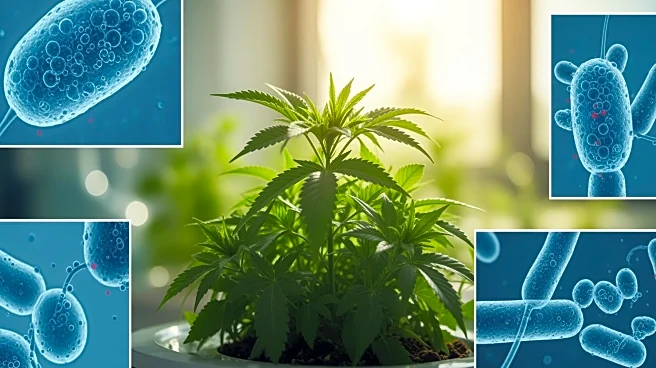What's Happening?
Researchers at Penn State have discovered that microbial activity within plant tissues, known as the endosphere, is significantly higher than in the surrounding soil or rhizosphere. This increased activity is attributed
to the nutrient-rich environment within plant tissues, which attracts active microbes. The study, led by Jennifer Harris, a doctoral candidate in Penn State's Intercollege Graduate Degree Program in Ecology, found that active microbes in the rhizosphere are more likely to enter the plant compared to dormant ones. The research utilized BONCAT-bioorthogonal non-canonical amino acid tagging, combined with flow cytometry and genetic sequencing, to identify active microbes. This method marks the first time BONCAT has been used to study microbial activity from soil to root surface and inside the root, offering insights into which microbes are beneficial in the soil-plant system.
Why It's Important?
The findings from Penn State's research have significant implications for agriculture, particularly in the context of organic and sustainable farming practices. Understanding which microbes are active and beneficial within plant systems can lead to improved crop yields and healthier plants, reducing the need for chemical fertilizers and pesticides. This research supports the growing demand for eco-friendly farming inputs and aligns with the increasing adoption of organic and regenerative agricultural practices. By identifying active microbes, farmers can enhance plant growth naturally, potentially leading to more sustainable agricultural systems and contributing to environmental conservation efforts.
What's Next?
The research opens avenues for further studies on microbial activity in different plant species and environments. Future research could explore how these active microbes can be harnessed or cultivated to improve crop resilience and productivity. Additionally, agricultural stakeholders may consider integrating these findings into farming practices, potentially influencing policy decisions regarding sustainable agriculture. As the demand for organic products continues to rise, the agricultural industry may see increased investment in microbial research and development, aiming to optimize plant growth and health naturally.
Beyond the Headlines
This research highlights the importance of microbial diversity and activity in sustainable agriculture. The ethical dimension involves reducing reliance on chemical inputs, which can harm ecosystems and human health. Culturally, the shift towards organic farming practices reflects a broader societal trend towards environmental consciousness and health awareness. Long-term, this research could contribute to a paradigm shift in agriculture, emphasizing the role of natural processes and biodiversity in food production.











